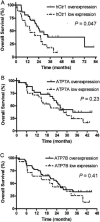Predictive and prognostic value of human copper transporter 1 (hCtr1) in patients with stage III non-small-cell lung cancer receiving first-line platinum-based doublet chemotherapy
- PMID: 21788094
- PMCID: PMC3319119
- DOI: 10.1016/j.lungcan.2011.06.011
Predictive and prognostic value of human copper transporter 1 (hCtr1) in patients with stage III non-small-cell lung cancer receiving first-line platinum-based doublet chemotherapy
Abstract
Background: Recent studies have shown that human copper transporter 1 (hCtr1), the major copper influx transporter, is involved in the transport of platinum-based antitumor agents. We investigated the predictive and prognostic values of hCtr1, and copper efflux transporters ATP7A and ATP7B, in patients with locally advanced non-small cell lung cancer (NSCLC) receiving first-line platinum-based chemotherapy.
Methods: From 2004 to 2009, we identified 54 consecutive stage III NSCLC patients who underwent first-line platinum-based doublet chemotherapy. Immunohistochemical studies of hCtr1, ATP7A and ATP7B on the paraffin-embedded pre-treatment tumor samples were performed and correlated with chemotherapy response and survival.
Results: Overexpression of hCtr1, ATP7A and ATP7B were observed in 68%, 48% and 74% of the participants, respectively. hCtr1 overexpression was associated with better chemotherapy responses (P<0.01); whereas ATP7A and ATP7B were not. Patients with hCtr1 overexpressing tumors had better progression-free survival (PFS) and overall survival (OS) (P=0.01 and 0.047, respectively). In multivariate analyses for chemotherapy response and PFS, only hCtr1 overexpression emerged as a favorable independent predictive and prognostic factor (all P<0.01).
Conclusion: This is the first report to state that hCtr1 is not only an independent predictor of platinum-based chemotherapy response but also a prognostic factor in stage III NSCLC.
Copyright © 2011 Elsevier Ireland Ltd. All rights reserved.
Figures



References
-
- Jemal A, Siegel R, Xu J, Ward E. Cancer statistics, 2010. CA Cancer J Clin. 2010;60:277–300. - PubMed
-
- Blinman P, Alam M, Duric V, McLichlan SA, Stockler MR. Patient's preferences for chemotherapy in non-small-cell lung cancer: a systematic review. Lung Cancer. 2010;69:141–7. - PubMed
-
- Lustberg MB, Edelman MJ. Optimal duration of chemotherapy in advanced non-small cell lung cancer. Curr Treat Options Oncol. 2007;8:38–46. - PubMed
-
- NCCN . Non-small cell lung cancer: NCCN clinical practice guidelines in oncology. v.2 2010.
-
- Schiller JH, Harrington D, Belani CP, Langer C, Sandler A, Krook J, et al. Comparison of four chemotherapy regimens for advanced non-small-cell lung cancer. N Engl J Med. 2002;346:92–8. - PubMed
Publication types
MeSH terms
Substances
Grants and funding
LinkOut - more resources
Full Text Sources
Medical
Research Materials

